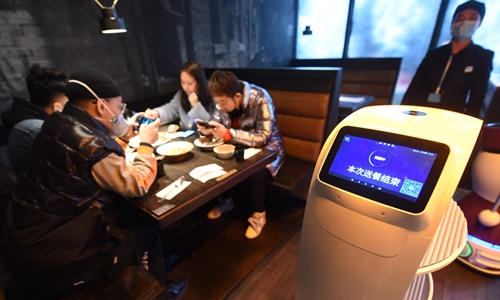
A robot waiter stands by a table in a restaurant in Hangzhou, East China's Zhejiang Province on Monday. As part of the effort involving epidemic prevention, many restaurants in the city have turned to such robots to lower people-to-people contact amid the epidemic. Photo: IC
China's Caixin/Markit services Purchasing Managers' Index (PMI) in February plunged to 26.5 amid the coronavirus epidemic. It is the first time the reading has fallen below the 50-point margin that separates expansion from contraction since the survey started in November 2005. The index in January was recorded at 51.8.The Caixin General PMI in February also declined, falling to 27.5 from 51.9 in January. The Caixin survey focuses on small and medium-sized private companies.
The steep decline underscores the lingering uncertainties among China's private services industry that is staggering under the immense impact of the coronavirus. Restaurants and shopping malls across China have closed due to worries over the potential further spread of infection. Chinese residents have also cancelled travel plans, leading to subdued consumption demand.
Economists noted that the services sector is particularly vulnerable to the strained cash flow as, compared to other industries, it has been difficult for services providers to recover losses during the coronavirus epidemic.
The slumping trend in the private services sector is also in line with that of the manufacturing sector.
China's Caixin manufacturing PMI also hit a record low in February, sinking to 40.3. China's official manufacturing PMI came in at 35.7 in February, also the lowest level in history.
According to documents released by the Supreme People's Court, a total of 249 Chinese firms declared bankruptcy from January 25 to February 21, when the epidemic was at its height.
Most of the companies were small and medium-sized enterprises in the retail, manufacturing and property industries. A total of 55 were from South China's Guangdong Province, the country's manufacturing and export hub.
But industry observers expect a rebound in private services soon, as millions of Chinese consumers have been trapped at home for months and are desperately eager to spend more, travel more, and eat more after the epidemic is under control.
Chinese policymakers have been introducing a slew of financial supports for industries heavily impacted by the epidemic. More measures to spur consumption and release capital into the market are also expected.
Global Times


